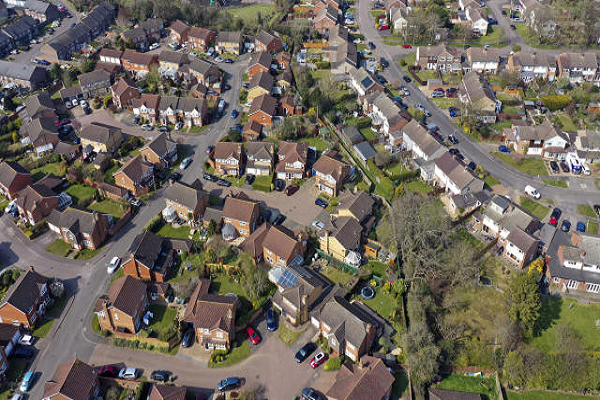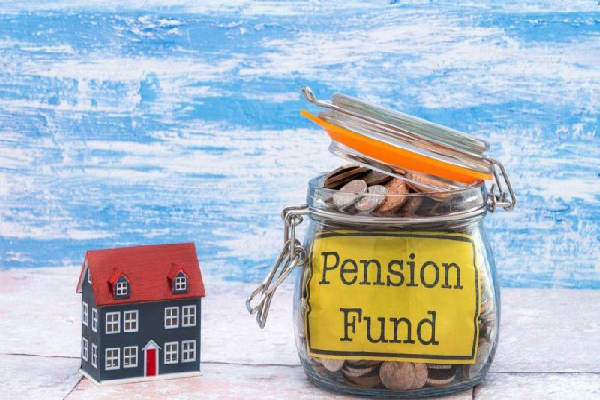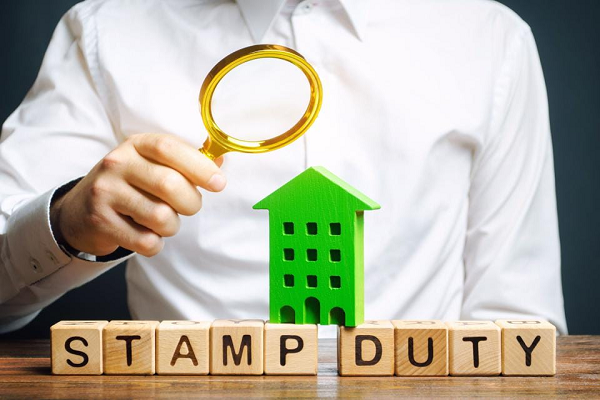UK Property Market’s Seemingly Endless Acceleration Continues
The overwhelming majority of UK homeowners saw the market values of their properties skyrocket throughout the course of last year. Newly released figures from Zoopla indicate an average annual price increase of 7.1%, equating to around £16,000.
Year-on-year, average house prices climbed from £224,800 at the end of 2020 to £240,800 in December 2021. Throughout the course of the year, a total of 1.5 million property transactions were recorded, the highest number of completions since the financial crisis.
In addition, the figures from Zoopla show that house prices increased in almost every UK region at a faster rate than in both 2019 and 2020 combined.
One of the market’s key drivers was the frantic race for space triggered by lockdown restrictions, as buyers abandoned busy urban centres in search of more spacious rural homes with private gardens.
Available inventory was quickly eradicated, leading to astronomic price hikes in desirable areas of the country.
“Such a busy market eroded the number of homes available to buy, as properties were being snapped up so quickly,” said Grainne Gilmore, head of research at Zoopla.
“This imbalance between demand and supply has put upward pressure on prices.”
Stamp duty holiday
The government’s temporary stamp duty holiday also motivated many to make their moves, with savings of up to £15,000 for those who beat the deadline.
Initially set to expire on March 31, the incentive was extended to June and partially continued until the end of September. All of which helped sustain the market’s momentum during a time when many had predicted a gradual slowdown.
Record-low interest rates also played a major role in the housing market’s stellar performance over the course of the past year. Still fixed at just 0.25% for the time being, ultra-low Bank of England base rates are making it cheaper for new and existing mortgage payers to finance home purchases.
However, a base rate as low as 0.25% is entirely unsustainable and will not be around forever. Mortgage payers locking in exceptionally low introductory rates are therefore being warned to expect significant increases going forward as the UK economy returns to strength.
A return to urban living?
When working from home became the new norm during the pandemic, millions exited the UK’s biggest cities in search of more spacious and affordable properties elsewhere. Today, major urban centres like London are seeing a slow but steady return as life gradually edges back to normal.
“We’ve already seen the capital start to awaken from its pandemic property market slumber with a return to the office and the growing demand from foreign buyers, all helping to cultivate early signs of house price prosperity,” commented Guy Gittins, chief executive of estate agent Chesterton’s.
Towards the end of 2021, estate agents reported an increase in buyer inquiries for the London area, up to 12% higher than a year earlier.
How this return to urban living affects broader property prices across the UK remains to be seen, but the race for space in quieter corners of the country is predicted to continue for some time.
Average UK Property Price Ends Year at Record £254,822
2021 closed out with the average UK property price at a new all-time high of £254,822. According to the latest figures released by the Nationwide Building Society, average house prices have increased by an astonishing £23,902 over the past 12 months.
The average UK house price rose by nearly £24,000 during 2021, the biggest increase ever recorded in a single year in cash terms, according to an index.
“The price of a typical UK home is now at a record high of £254,822, up £23,902 over the year, the largest rise we’ve seen in a single year in cash terms,” commented the bank’s chief economist, Robert Gardner.
“Prices are now 16% higher than before the pandemic struck in early 2020.”
While the withdrawal of the temporary stamp duty holiday had been expected to trigger a gradual slowdown, the sector’s stellar performance continued right through to the end of the year.
“Mortgage approvals for house purchases have continued to run above pre-pandemic levels, despite the surge in activity seen earlier in the year. Indeed, in the first 11 months of 2021, the total number of property transactions was almost 30% higher than over the same period of 2019,” Mr. Gardner said.
“At the same time, the stock of homes on the market has remained extremely low throughout the year, which has contributed to the robust pace of price growth.”
An inevitable slowdown in 2022
The combination of numerous economic and political factors will lead to a gradual yet inevitable slowdown for the sector in 2022, analysts predict. Though property prices are set to continue hovering around all-time highs, monthly house price growth is expected to slow throughout 2022.
Speaking on behalf of wealth management firm Quilter, mortgage expert Karen Noye warned that a gradual slowdown in house price growth may not make the market more accessible for first-time buyers.
“As we move into 2022, and away from the whirlwind property market seen throughout 2021—we are likely to see a slowdown in property prices and transactions, particularly if the Bank of England further increases interest rates,” she said.
“While we may see the property market slow, this does not mean buying a home will become instantly more affordable. Alongside the already inflated housing market, mortgage rates have increased following the Bank of England’s rate rise, and as inflation does not appear to be slowing, costs will likely continue to rise.”
“Increased mortgage costs coupled with the uncertainty surrounding the Omicron variant could well make people think twice about moving home, and we could see a break in house price growth as a result. However, supply versus demand issues persist, so we are likely to see a gradual slowing of growth as we head into 2022 as opposed to a sharp drop.”
Impressive end-of-year performance
The sector’s performance during what would traditionally be a fairly quiet time of the year suggests demand will continue to outstrip available supply for some time to come.
“Although the last month of the year tends to be quieter for the market as people wind down for Christmas, there was still plenty of interest in buying homes, and more demand than supply pushed house prices up further still,” commented Mark Harris, chief executive of mortgage broker SPF Private Clients.
His sentiments were echoed by the commercial director of property lender MT Finance, Gareth Lewis, who suggested the wave of post-lockdown demand unleashed on the market is helping sustain its momentum.
“Although many people have made their move, there is still plenty of pent-up demand, which will keep property prices high,” he said.
A Brief Look at the Buy-to-Let Landscape Right Now
Buy-to-let was popular in the UK long before the concept was formally introduced, almost exactly 25 years ago. For investors, the appeal of an attractive buy-to-let investment is obvious.
Along with providing regular income through rental payments, capital gains through house price increases are also on the cards.
It comes as no surprise to learn that interest in buy-to-let investments remains consistently high across the UK.
30 years ago, average UK house prices were somewhere around the £60,000 mark. Today, the figure has exceeded £250,000. Homeownership is simply impossible for many, or not the preferred option for others.
As a result, the UK’s private rental sector continues to go from strength to strength, with investors reaping the benefits of record-high demand.
Flexibility and compassion
The unfortunate events of the past 18 months have cast further light on the attitude and approach of today’s buy-to-let landlords. For example, research suggests that during the course of the pandemic, around two-thirds of private landlords in the UK demonstrated flexibility with tenants’ payments, who were struggling financially as a result of the crisis.
Furthermore, around 80% said that they would be happy to accept a lower monthly rent payment in return for reliable long-term tenants. Only 55% indicated their intent to increase monthly rents over the course of the next year, suggesting that almost half will not be putting their prices up.
In terms of portfolio expansion, almost 40% of investors said they had purchased another buy-to-let property between July 2020 and September this year. Interestingly, almost one third said that they had attempted to expand their portfolio, but were unsuccessful in doing so.
Issues with qualifying for loans with conventional high-street banks were cited as one of the main reasons for failed investments, with many having turned to flexible bridging loans to expand their property portfolios.
An attractive and profitable venture
Perhaps most importantly, around 70% of landlords believe that buy-to-let investments are still an attractive and potentially profitable option. This is particularly relevant when considering the UK’s skyrocketing average house price, making it more expensive than ever for investors to buy homes.
In addition, the UK government continues to make life difficult and expensive for private landlords, who have been hit by a raft of taxation and regulation adjustments over recent years. One of which was the additional stamp duty levy of 3% introduced in 2016, followed shortly by a significant mortgage interest tax relief reduction.
Still, nothing seems to have quelled the appetite of investors, who continue to see BTL as a comparatively safe haven. With available inventory and affordable housing having all but dried up across the country, the private rental sector will continue to play a pivotal role in the UK’s wider housing market indefinitely.
No Signs of a Housing Market Crash on the Horizon
According to the latest figures from Nationwide, house price growth may be slowly beginning to decelerate. But what has become clear is that the withdrawal of the government’s temporary stamp duty incentive has not led to the housing market crash many had predicted.
In fact, there are no signs of anything close to a cliff-edge situation on the horizon, nor are there likely to be any as we head into the New Year.
Analysts have been in no doubt that the meteoric monthly growth in house prices recorded throughout 2021 could not hold its momentum indefinitely. Average house prices are still hovering around all-time highs in most regions, and annual house price growth for September still came out at 10%.
This represented a slight decline from the 11% year-on-year growth recorded in August. Compared to the beginning of last year, average house prices across the UK are up around 13% overall.
A combination of pent-up demand being released on the market and the temporary Stamp Duty holiday fuelled explosive property price growth during the first few months of the year. The consensus therefore suggested a crash was inevitable as demand began to slow and the Stamp Duty holiday expired.
In reality, prospective buyers are still competing frantically for desirable properties in popular parts of the country. In addition, the gradual return to city centre living and working is having an impact on the prices of properties that were not particularly popular during the pandemic.
Low-interest rates and a lack of inventory
Another factor that continues to fuel the market’s consistent performance is the availability of exceptionally affordable mortgages.
Recent months have seen a slew of 95% LTV products return to the market for the first time since the beginning of the pandemic. With deposit requirements being one of the biggest obstacles for first-time buyers looking to get on the housing ladder, 95% of LTV mortgages have understandably proved popular, at least among those in a strong enough financial position to qualify for them.
The combination of low-interest rates and a lack of available inventory across much of the country is likely to continue driving competition among prospective buyers over the coming months. As there is already insufficient supply available to meet demand, competition for available properties is only likely to escalate as we move into the new year.
The governor of the Bank of England has stated clearly that interest rates will have to be increased at some point next year in order to curb inflation. But even then, available inventory will not be nearly sufficient to cope with demand.
The likelihood of anything close to a housing market crash or a sudden plummet in house prices is more or less zero.
New EPC Requirements Prompt Landlords to Consider Selling BTL Properties
Around 52% of UK landlords are seriously considering selling up as new regulations for Energy Performance Certificates are proposed.
All new rental tenancies will be required by the government to have at least a rating of C by April 2025, while existing tenancies’ ratings are expected to reach the same target by 2028 in order to meet updated energy efficiency requirements.
A survey of 600 landlords, conducted by TWM (The Mortgage Works), revealed that many felt they would not be able to meet the requirements in the timescale set out due to issues such as finances and the time needed to complete the work.
The current regulations set out stipulate that rental properties must have an EPC rating of E or above.
Landlords most likely to sell were those with larger property portfolios, with 58% of those with six to ten properties stating that they would be inclined to sell some, if not all, of their rentals. For landlords with twenty or more properties, the figure rises to 63% of those who would opt to sell. Those who took part in the survey who had only one rental property were significantly less likely to sell, with only 35% considering this option.
Head of lending at The Mortgage Works, Daniel Clinton, said: “With currently less than four years before all new tenancies need to be in properties rated EPC C or above, there are still landlords who need to undertake remedial work on at least one of their properties.”
“They are therefore understandably concerned about how they will both fund the work, find someone to do it, and have it completed in time.”
Daniel added: “The side effect of these concerns is that a significant number of landlords admit they are ready to give up and are already considering selling properties.”
“An unintended consequence of this sentiment could result in a backwards step in meeting the government’s target around climate change, for example, if these properties are taken up by the owner-occupier market, where there are currently no minimum energy efficiency requirements.”
The more properties, the more impact
Landlords with the largest portfolios will be the most impacted by the proposed changes, due to the increased number of homes that will need to be renovated and the associated costs.
Statistics revealed by the survey show that those with 4–5 properties were likely to need to renovate around 2 of those properties. This increased to 4 for those with 6 to 10 and 12 for landlords with 20+ rentals. 52% of landlords with a single property claimed to have already met the requirements, while 35% said their property currently sits between D and G ratings.
Do landlords know exactly what is required?
Respondents to the survey showed that 66% were aware that their properties would require upgrading to meet the targets; however, 33% of these admitted that they did not know exactly what renovations would need to be done.
Of those more familiar with the changes needed, 37% thought that insulation would be needed, 25% thought boiler upgrades were necessary, and 24% said refurbishing existing utilities would be the key change.
The figure for properties needing essential insulation rose to 59%, and those needing new boilers increased to 37% among those with a larger portfolio (twenty plus properties).
Renovation costs
According to research, the average amount that landlords keep aside for maintenance and upkeep costs for their rentals is £15,597. According to the survey, however, only 49% had these funds available, with the other 51% falling short and having around £10,000 on average.
Large portfolio landlords tended to have more funds available, with an average of £35,202.
Clinton said: “Financing is also key, and while our research suggests landlords have money set aside to deal with unexpected costs arising from their properties, it may not be enough to also cover energy efficiency improvements.”
UK Property Prices Still Hovering At All-Time Highs
Record-high house prices show no signs of abating, with the latest figures from Rightmove indicating a continuation of ferocious competition for desirable properties.
Available inventory across the UK remains at an all-time low, pushing average house prices up another 0.3% in September. This took the average UK property price to £338,462 last month, £15 higher than the previous record set in July.
This suggests that the expiration of the stamp duty holiday did not have the major impact on the sector many analysts had expected. However, it also suggests that the sector may be slowly stabilising as record monthly gains give way to more modest growth.
“It’s to be expected that the astronomic rates of house price growth seen since the introduction of the stamp duty holiday will now start to subside as we approach the final deadline,” commented James Forrester, managing director of Barrows and Forrester.
“But don’t be fooled into thinking the market will now deflate like a cheap birthday balloon. Buyer demand is extremely high, and property prices will remain robust, largely driven by second- and third-rung buyers upgrading to larger, higher-value homes.”
“Competition among potential buyers to secure their next home is now more than double what it was this time in 2019,” said Tim Bannister, Rightmove’s director of property data.
Mr. Forrester went on to discuss how buying power continues to play into the hands of wealthier movers and buyers, but also how there is more to beating rival buyers to the punch in today’s competitive market.
“To be in pole position in the race for the best property, you need to have greater buying power than the rest of the field,” he said.
“That traditionally would mean deeper pockets to outbid other buyers, but in the most competitive market ever, today’s power buyers also need to have already found a buyer for their own property, or to have no need to sell at all.”
“Proof that you are mortgage-ready or can splash the cash without needing a mortgage will also help you get the pick of the housing crop.”
A property boom for London?
Annual house price growth across much of the UK has been astronomical, with five areas having achieved year-on-year growth in excess of 8%: the South West, Wales, the East Midlands, the East of England and the South East.
Annual house price growth in Greater London came out at just 0.8%, attributed to the new trend of working from home and buyers subsequently seeking more spacious properties outside the capital.
However, sluggish property price growth in London could prove to be a catalyst for its performance over the coming months.
As life slowly returns to some form of normality, there are those who believe London could be on the brink of a major increase in real estate market activity.
“The London market is poised for a strong finish with an abundance of stock now available and a sharp uplift in domestic and foreign demand being driven by pandemic restrictions lifting both where the workplace and travel are concerned,” commented Marc von Grundherr, director of Benham and Reeves.
Should I Overpay My Mortgage or Increase My Pension Savings?
Everyone has their own unique approach to safeguarding their financial future. There is no such thing as a one-size-fits-all strategy, as it depends entirely on the current financial circumstances and long-term goals of the individual in question.
One of the most contentious points on the subject of future planning is whether it makes more sense to repay your mortgage early or put more money into your retirement pot. Both of these could technically put you in a much stronger financial position in years to come, but which of the two is more advantageous?
Should you pursue the tax benefits of more pension savings at your disposal or enjoy the freedom of a life with no outstanding mortgage payments?
Overpaying your mortgage
For most people, their mortgage is the single biggest debt they will take on during their lives. Where possible, it can be tempting to overpay your mortgage in order to pay off the full balance earlier. Whether you overpay regularly or on occasion is up to you, but the overall benefit is the same: mortgage freedom much sooner.
Overpaying your mortgage can be beneficial in numerous ways. You quickly build equity in your home, enabling you to access much better deals if you decide to remortgage or borrow more. In addition, repaying early can lead to significant savings in long-term interest payments and overall borrowing costs.
Early repayment of a mortgage also means taking full ownership of your home at an earlier date. After which, you will no longer face the potential risk of your home being repossessed in the event that you fall behind on your repayments.
With average monthly mortgage payments in the UK now exceeding £750, this amounts to a lot of extra money in your pocket each month after repaying your mortgage early.
Paying towards your pension
The alternative option is to continue repaying your mortgage as normal while investing your extra money in your pension pot. One of the biggest benefits of doing so is the tax relief associated with pension funds, as by adding to your pension pot, you are effectively reducing your taxable income.
For example, each time you pay £100 into your pension pot, HMRC tops it up with a further £25. This increases to £50 for higher-rate taxpayers, who stand to benefit even more from the tax incentive.
Each year, you can pay anything up to £40,000 into your pension pot, which, over the course of several years, could add up to significant pension savings.
What works for you?
As touched upon previously, making the right decision means deciding what works for you. It depends entirely on whether you want to have more money in your savings when you retire or benefit from mortgage freedom. Both of which could make a huge difference to your financial security following retirement, though in somewhat different ways.
If in doubt, consult with an independent broker or financial adviser in order to gain a better understanding of the pros and cons of both options.
Property Sales Drop by Over a Half as Stamp Duty Returns
Between September and October this year, housing transactions fell by a whopping 52%, according to HMRC. With the stamp duty holiday saving buyers in total over £6.4 billion, it’s not surprising that property purchases have fallen so dramatically. At the same time, the average home price has risen by £28,000, making it more difficult for many to get a foot on the property ladder.
Last month, the UK saw 77,000 property transactions, indicating a 52% fall from the previous month and a 28% drop from last October. HMRC said the decrease was primarily due to purchases being pushed through in time for the September 30th deadline.
The stamp duty holiday was initially brought about to boost the property market following the 8-week shutdown during the initial lockdown. Buyers were no longer required to pay stamp duty for property prices up to £500,000 between the months of July 2020 and June 2021, tapering off and eventually being fully withdrawn at the end of September 2020. This initially led to savings of up to £15,000 for home buyers and up to £2,500 during the tapering period.
Although there has been a recent home sale plummet, during this financial year there have been 842,250 property transactions, the highest recorded in a decade. In 2021, transactions peaked in March, June, and September.
With the stamp duty holiday creating a boosted property market, it’s not surprising that experts are calling for the tax to be scrapped permanently.
Director of property lender MT Finance, Joshua Elash, commented: “The monthly decrease in the volume of residential transactions is dramatic.”
‘The argument for either reworking or scrapping stamp duty together has never been louder or clearer.
‘Stamp duty is the tax holding back a property market that would benefit now more than ever from greater levels of fluidity.’
Although in total buyers saved £6.4 billion, data shows that due to factors driving up property prices, house prices were significantly higher.
Figures from the Office of National Statistics show that the average price of a home rose by £28,000 in the year up to September, signifying an 11.8% year-on-year increase.
CEO of The Guild of Property Professionals, Iain McKenzie, said: ‘A sharp drop in property transactions in October suggests that forestalling since September has caught up with the property market.’
He also stated that even though property sales were down, house prices were likely to keep increasing in the short term.
‘While transaction numbers may be lower now that the stamp duty holiday has ended, the fact that the demand for properties currently far outstrips supply means that prices are likely to keep rising,’ McKenzie added.
‘At a time when there is often a rush to get moved in before the festivities commence, we should expect that sales will continue to be steady in the run-up to Christmas.’
Others have, however, predicted that property prices are destined to fall as a result of the expected rise in the Bank of England’s interest rate, which will result in more expensive mortgages.




 0116 402 7982
0116 402 7982







